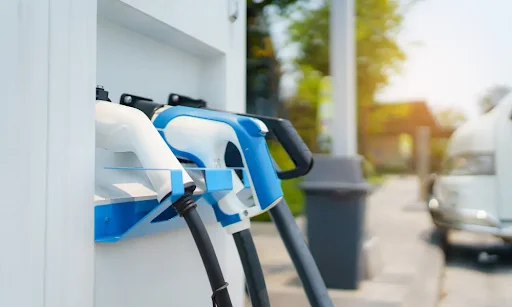As electric vehicle (EV) adoption grows, the demand for charging infrastructure is also on the rise. Understanding the costs associated with different types of chargers is crucial for both residential and commercial users when making installation decisions. There are three main types of EV chargers: Level 1, Level 2, and DC Fast Chargers, each with its own cost structure, charging speed, and best-use scenarios.
ALSO READ: Unlock Code Efficiency with Mirror Programming AI Access
Level 1 Chargers
Level 1 chargers use a standard 120V household outlet, making them the simplest and most affordable option. The equipment cost typically ranges from $200 to $600, and installation is generally inexpensive because it can be plugged into a standard outlet. However, some users may need to upgrade their electrical systems to accommodate the charger. Total costs usually range from $200 to $1,000. A home EV charger is perfect for users who drive short distances daily and can charge their vehicle overnight.
Level 2 Chargers
Level 2 EV chargers require a 240V power supply and charge vehicles much faster than Level 1 chargers, providing 10 to 60 miles of range per hour. These chargers are suitable for home, office, and public installations. The equipment costs typically range from $500 to $2,500, while installation costs range from $500 to $2,000, depending on the complexity of the electrical system. Total installation costs typically fall between $1,000 and $4,500. Level 2 chargers are ideal for most businesses and homes where faster charging is needed.
DC Fast Chargers
DC Fast Chargers are the most expensive option, often found in high-traffic areas like highway rest stops and large commercial parking lots. These chargers can charge an EV up to 80% in about 30 minutes, offering 60 to 200+ miles of range per 30 minutes of charging. Equipment costs can range from $20,000 to $150,000, and installation requires significant upgrades to electrical infrastructure, including transformers and grid connections. Installation costs typically range from $50,000 to $150,000. Total costs can reach $70,000 to $300,000, making DC Fast Chargers a significant investment. However, due to their rapid charging capabilities, they provide a good return in high-demand locations.
Operating and Maintenance Costs
Level 1 chargers consume less electricity, keeping operational costs low, and require minimal maintenance, typically limited to occasional inspections. Level 2 chargers have moderate operating costs due to faster charging speeds, but they still offer a reasonable balance of performance and energy efficiency. Maintenance is required, including inspections and software updates, but costs remain manageable. DC Fast Chargers consume a lot of electricity due to their high-speed charging, resulting in higher operational costs. Maintenance is more expensive as well, with regular checks needed for complex systems like cooling units, software updates, and hardware repairs. Although their operating costs are higher, DC Fast Chargers can generate significant revenue due to their high usage rates in public spaces.
Use Cases and ROI
Level 1 chargers are primarily for home use, ideal for those who do not need fast charging. Level 2 chargers are widely used in homes, businesses, and public spaces where faster charging is needed, making them a great option for workplaces and commercial properties. DC Fast Chargers, although costly, are essential for high-traffic public areas or highway stations where quick charging is needed for drivers in a hurry. For businesses, Level 2 and DC Fast Chargers offer potential for revenue generation through pay-per-use or subscription models, while Level 1 chargers typically do not generate direct revenue. However, they provide convenient charging options for residents or small businesses.
Conclusion
The cost of installing EV chargers depends on the type of charger and its intended use. Level 1 chargers are the most affordable and suitable for home use, providing slow charging. Level 2 chargers offer a balance between cost and charging speed and are ideal for homes and commercial settings. DC Fast Chargers are the most expensive but are necessary for high-traffic locations where fast charging is essential.
When choosing a charger, businesses and consumers should consider their specific needs, location, and long-term goals. With government incentives and subsidies on the rise, the right investment in charging infrastructure will not only support the growing demand for EVs but also create opportunities for businesses to generate revenue.







